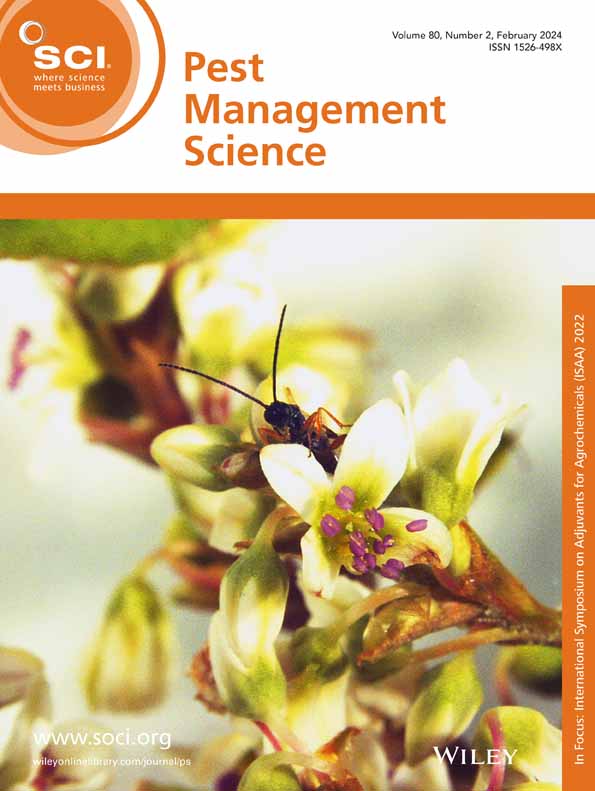Inherent preference restricts host preference switching to a low-quality host in the generalist parasitoid wasp, Scleroderma guani.
IF 3.8
1区 农林科学
Q1 AGRONOMY
引用次数: 0
Abstract
BACKGROUND Hymenopterous parasitoids serve as important biocontrol agents, offering a unique opportunity to investigate transgenerational effects in host adaptation. The phenotype and experiences of maternal wasps can influence various traits in their offspring, potentially influencing host-switching dynamics. Here, the inherent host preferences were explored in two colonies of a parasitoid Scleroderma guani, reared on Monochamus alternatus and Saperda populnea beetles respectively. The inherent influence of rearing history and maternal wasp experience on host preference plasticity is further discussed. RESULTS The Monochamus alternatus-reared colony maintained an inherent preference for Monochamus alternatus while the Saperda populnea-reared colony showed a neutral tendency. These inherent preferences drove inter-colony differences in host preference plasticity, constraining preference shifts toward the lower-quality host Saperda populnea. Subsequently, a host-exchange experiment spanning five generations revealed a fitness-dependent preference shift when Saperda populnea-reared wasps were reared on Monochamus alternatus: the transition to Monochamus alternatus (a higher-quality but more defensive host) was postponed until maternal wasps adapted to host resistance by the fourth generation. CONCLUSION In this case, Scleroderma guani presented an adaptive host preference shift strategy in consideration of ancestral experiences and fitness, providing insights into how generalist wasps maintain selective host preferences. These findings also have practical implications for optimizing artificial breeding of Scleroderma guani to enhance its efficacy in biocontrol against Monochamus alternatus, the primary vector of pinewood nematode. © 2025 Society of Chemical Industry.固有偏好限制了广泛性拟寄生蜂对低质量寄主的偏好切换。
膜翅类寄生蜂是重要的生物防治媒介,为研究寄主适应的跨代效应提供了独特的机会。母蜂的表型和经验可以影响其后代的各种性状,潜在地影响寄主转换动力学。本研究对两种寄生性鸟硬皮病(Scleroderma guani)幼虫的固有寄主偏好进行了研究。进一步讨论了饲养历史和母蜂经历对寄主偏好可塑性的内在影响。结果褐家鼠饲养的群体对褐家鼠保持固有的偏好,而白蚁饲养的群体对褐家鼠表现出中性倾向。这些固有的偏好驱动了寄主偏好可塑性的群体间差异,限制了寄主向低质量寄主Saperda populnea的偏好转移。随后,一项跨越五代的寄主交换实验表明,当野蜂饲养的黄蜂饲养在交替单足黄蜂(一种质量更高但更具防御性的寄主)上时,适应性依赖的偏好转变被推迟,直到第四代母黄蜂适应了宿主的抗性。结论在本研究中,瓜硬皮虫表现出了一种考虑祖先经验和适应性的适应性寄主偏好转移策略,为多面手黄蜂维持选择性寄主偏好提供了新的思路。本研究结果对优化瓜硬皮病的人工育种,提高其对松材线虫主要病媒交替单鼠的生物防治效果也具有实际意义。©2025化学工业协会。
本文章由计算机程序翻译,如有差异,请以英文原文为准。
求助全文
约1分钟内获得全文
求助全文
来源期刊

Pest Management Science
农林科学-昆虫学
CiteScore
7.90
自引率
9.80%
发文量
553
审稿时长
4.8 months
期刊介绍:
Pest Management Science is the international journal of research and development in crop protection and pest control. Since its launch in 1970, the journal has become the premier forum for papers on the discovery, application, and impact on the environment of products and strategies designed for pest management.
Published for SCI by John Wiley & Sons Ltd.
 求助内容:
求助内容: 应助结果提醒方式:
应助结果提醒方式:


